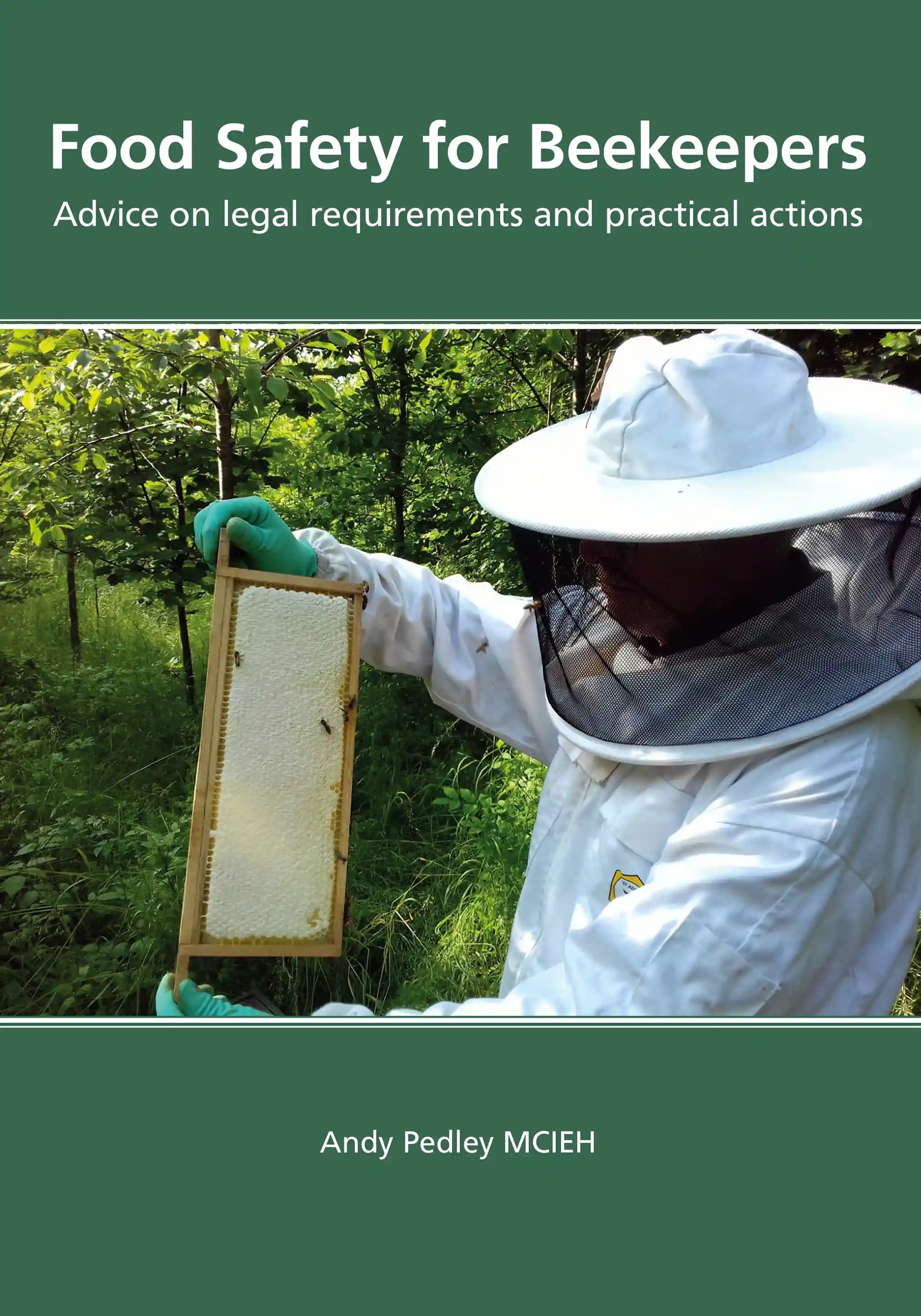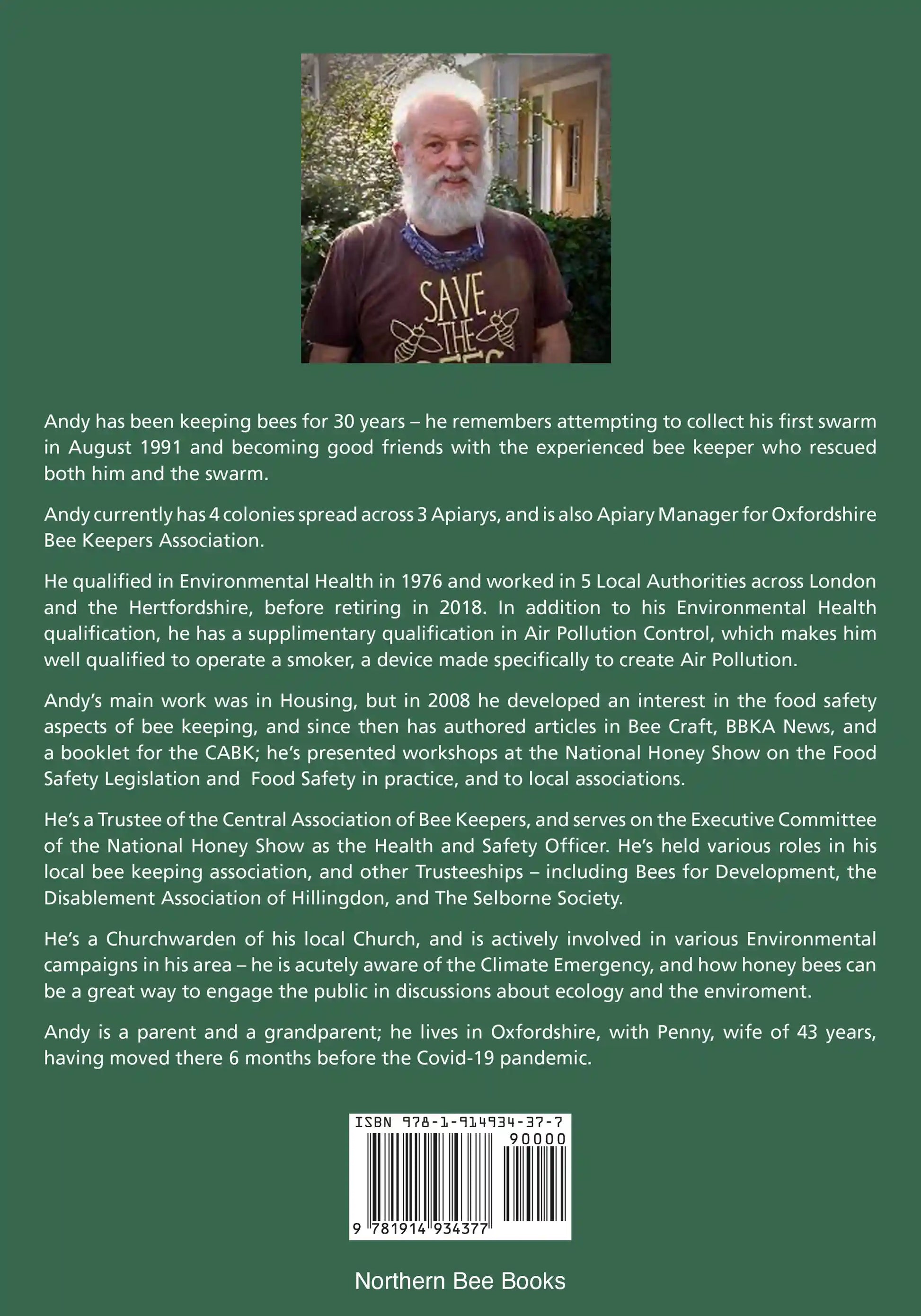Food Safety for Beekeepers by Andy Pedley


Food Safety for Beekeepers
Beekeepers are unusual, as their activity (which is often "just a hobby") is the production of food that may be sold to the public. Many will see the process through from the very beginning - making hives, sourcing bees, setting up apiaries, and managing the bees, right through all stages of harvest, processing, packing, labelling, to retail sale.
Training is usually through local beekeeping associations, who often use a curriculum set by the British Beekeepers Association; this focuses on the practical sides of beekeeping, husbandry and the like, and it is intended to lead on to further study with Modules, and even the National Bee Diploma, the pinnacle of the possible qualification.
The BBKA's Module 2 assessment includes food production and hygiene: the "bee press" occasionally have articles or a mention.
There is little reliable guidance for beekeepers on the food production side, which is quite surprising. Although many beekeepers are hobbyists, with a few hives, and very limited sales, many have a number of hives. Of course, there are also bee farmers with many hives, producing significant quantities of honey and related products in commercial quantities. It's surprisingly easy to progress from a couple of hives to several, to having many!
There are often enquiries on social media about honey, processing, or legal requirements. The sometimes less-than-expert responses often perpetuate old practices or information, which were not always correct to start with. For instance, I've seen it stated that in order to label honey with its botanical origin, it needs to contain variously 40% through to 70% of that nectar; but neither of these numbers is mentioned in the UK legislation. Another misrepresentation is that you don't need to register as a food business if premises are used for less than five days in five consecutive weeks: this is based on the Food Premises (Registration) Regulations 1991. However, these were superseded by Retained Regulation (EC) 852/2004, which contained no such exemption; there's full information in the relevant paragraph.
In this book, Andy (an Environmental Health Officer for 46 years and a beekeeper for 30) explores the Consumer Protection law that applies to beekeepers and bee farmers. The book principally deals with Food and Food Safety, and includes a full HACCP that covers both extracted and comb honey. The book includes other products – Candles, Melts, Wraps and Polishes. The intention is to give as comprehensive picture as possible of both the legal requirements, and at the same time, practical advice to achieve the highest quality product and achieve a high Food Hygiene Safety Rating.
Andy Pedley has been keeping bees for 30 years, and as an Environmental Health Officer, developed an interest in the law on food safety as it applies to bee keepers and honey production about 14 years ago, realising that there was a fair amount of misinformation and traditional, but not always good, practice, among beekeepers. In 2009, he authored a series in BeeCraft, a UK magazine, on the Food Safety Legislation, and has authored other relevant articles for them too – on the Honey Regulations and Recycling jars.
VIEW Contents
- Preface
- The Law
- Aim of the legislation
- A food business?
- Business Model
- A Step-by-step Approach
- At the hive
- Harvest
- Extraction and processing
- Labelling
- Discretionary labelling
- Storage prior to sale
- A management system
- Products
- Hive products
- Other products
- Cosmetics
- Medicinal and pharmaceutical products
- Food Rooms
- Food Contact Materials
- Food Handlers
- Cleaning
- Cleaning equipment
- Cleaning premises
- Traceability
- Allergens
- Processing Equipment
- Second-hand Equipment and Recycling Jars
- The Honey Regulations
- Definitions of different honeys
- Filtered honey and Baker’s honey
- Country of origin
- Floral sources
- Geographical origin
- Enzymes
- Specific quality criteria
- Registration
- Food Crime & Fraud
- Sampling Programmes
- Analysis
- Enforcement
- Rights and powers of officers
- The inspection process
- GM crops
- Due Diligence
- Organic
- Quantities and Weighing
- Weighing systems
- Weighing equipment
- Durability
- Caveat
- Appendix 1
- Appendix 2
- Endnotes
- Alphabetical Index
VIEW Book Review
Reviewed by John Pilgrim (Health and Safety Officer) published in Gwenynwyr Cymru WBKA Autumn 2022
So you've built the hives, filled them with foundation, bought the nucs or caught the swarms, and tenderly managed the progress of the colonies to the point where you are about to harvest the honey. But honey is a food. What are the rules and regulations that the beekeeper must follow? What are the standards of purity and hygiene that must be achieved if you intend to sell some of your harvest or even just give it to your friends? And do these questions extend to other hive products such as candles, melts, wax wraps and polishes? Are the bee 'treatments' used in your hive registered and can protective treatments affect the honey?
This book will give you the answers. It is written by Andy Pedley an Environmental Health Officer for 46 years and a beekeeper of 30 years. He runs the Oxfordshire BKA Apiary, is a Trustee of the Central Association of Beekeepers (CABK), and the Health and Safety Officer for the National Honey Show. He has written articles about food hygiene for BeeCraft, BBKA News, and a booklet for CBKA, and has presented workshops on food safety legislation and food safety in practice.
The book is a tour de force and provides the most complete coverage of the subject available in print. It is well worth a read as a one stop source of information on food safety and the law from hive to sales, with much advice on the practical actions that can and should be taken by the beekeeper or bee farmer. We are reminded that ignorance of the law is no defence and that we are producing and handling FOOD. A plea of due diligence is discussed. All the tools and equipment used need to be of food grade which, as he says, leaves out recycled net curtains and lady's tights as filters. Most plastics may be unusable, and we even need to ask whether plastic foundation is food grade?
If you sell honey, do you need to be registered as a business and what criteria make a food handler fit to work. The book covers the essential details about the design and management of a 'Honey room' and essential record keeping. You also need to consider where things can go wrong and identify the points in the process where mistakes can be made, or accidents happen. The book covers these questions and provides a Hazard Analysis and Critical Control Point (HACCP) for both extracted and comb honey.
Once the issues of food hygiene have been considered and the honey is in the jar, there are questions about the design of the label. What can you say about food composition? What are the requirements for a 'Best before date'? Are you in hot water with the law if you use terms such as 'raw' or 'organic' honey? Then there are issues of food crime, fraud, and GM crops that you will want to avoid. Finally, the book also covers the powers of enforcement available to the Environmental Inspectors.
This book contains a long list of references and is a valuable source of information for those studying for the BBKA Module 2 assessment or who are en route for the NDB. There is also an online course leading to the Qualification Level 2 Certificate Food Hygiene and Safety with an average cost of £12 to £15 that will give you basics that are looked for by an Environmental Inspector.
Unavailable